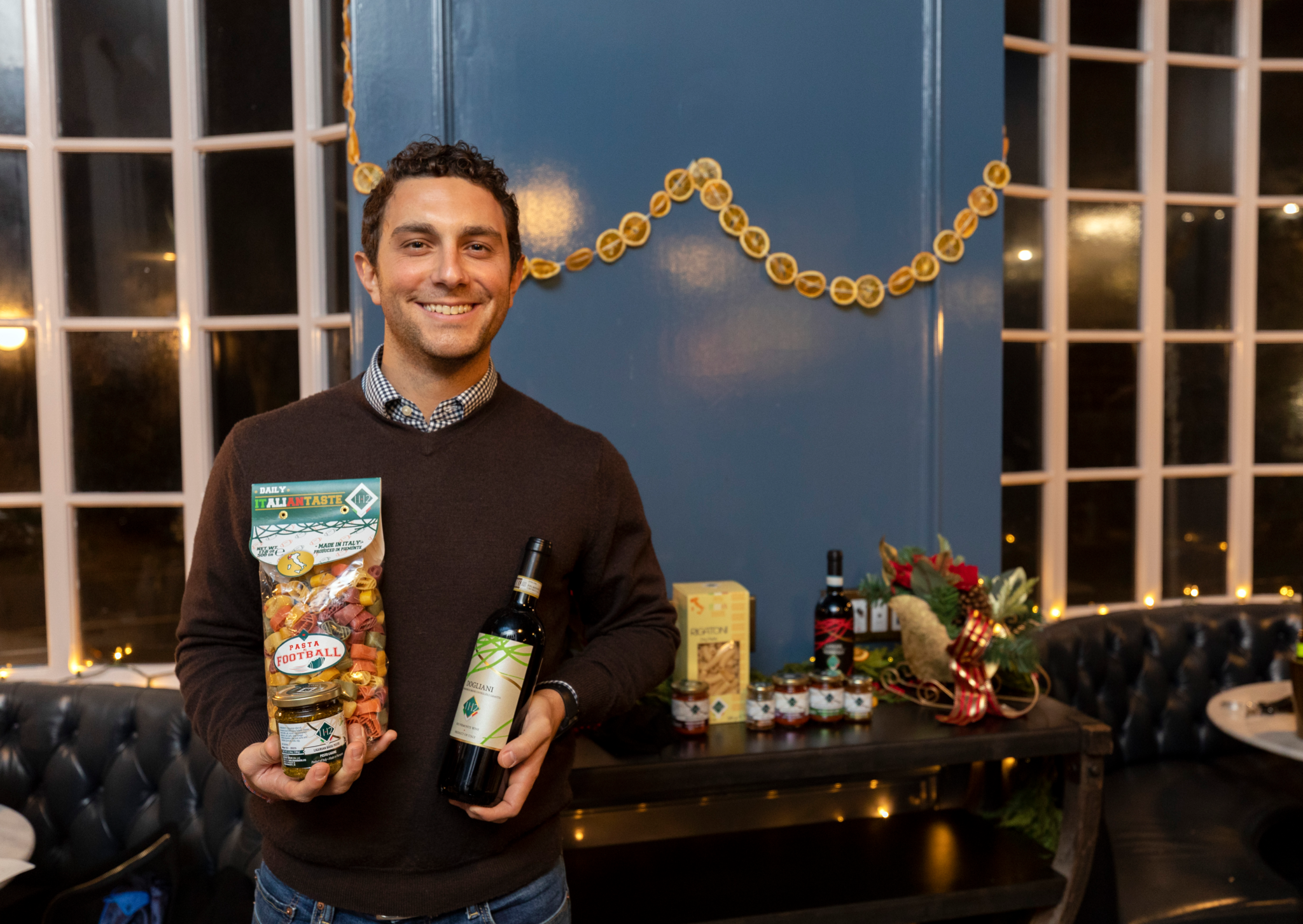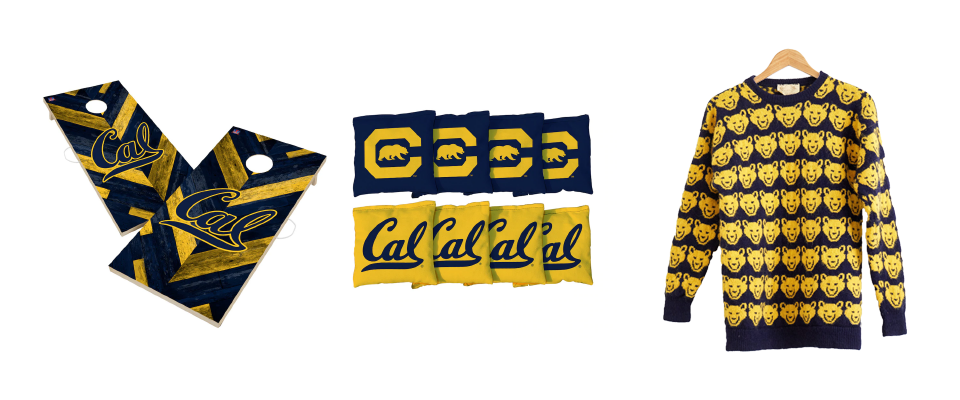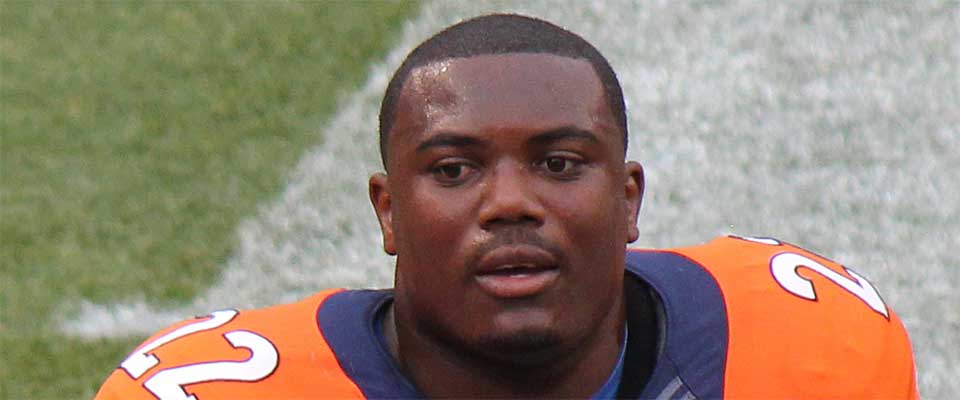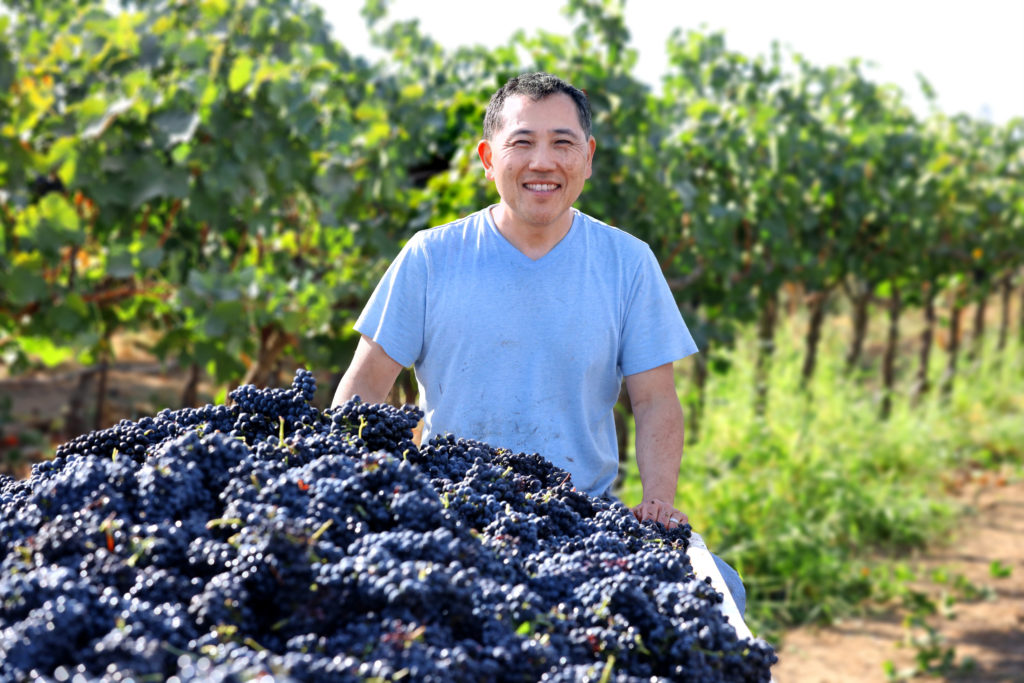Born in Milan, Italy, Giorgio Tavecchio ’12 spent his early childhood living in the U.S. and Italy. In 2005, Tavecchio and his family moved to Moraga, California. He attended Campolindo High School, playing soccer there; on a whim, he found he had a knack for kicking footballs while at a team barbeque. He joined the Golden Bears’ football team as a walk-on kicker in 2008 and started all four seasons while at Cal. Tavecchio went on to the NFL as a kicker for the San Francisco 49ers, Green Bay Packers, Detroit Lions, Oakland Raiders, Atlanta Falcons, and Tennessee Titans. He has also played for the XFL’s Los Angeles Wildcats and, in Europe, for the Milano Seamen and Barcelona Dragons.
While football plays a significant part of Tavecchio’s life, so do his passions for food, wine, and helping others create memories around a dinner table, leading to the start of ElevenTwelve.
The Cal Alumni Association spoke with Tavecchio for our Bears in Business series, where Cal alumni connect their time at Cal with their professional ventures.
Cal Alumni Association (CAA): Where are you from? How did you choose Berkeley?
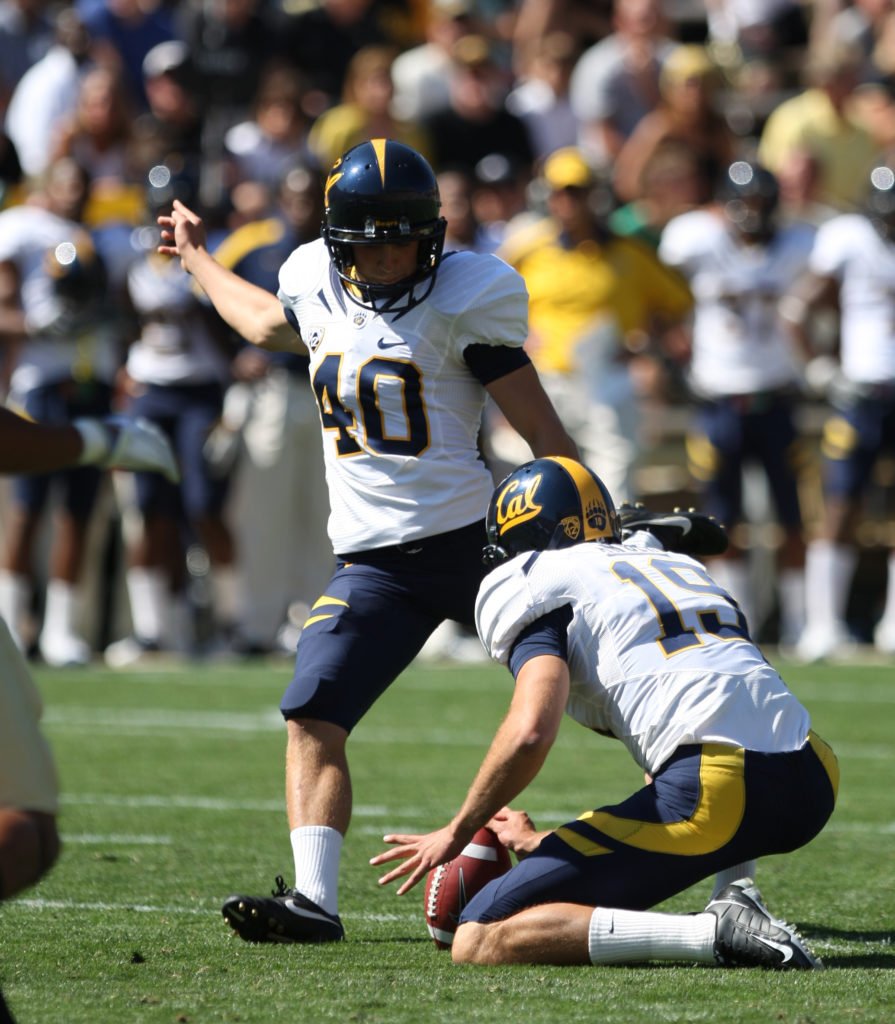
GT: Originally I am from Milan, Italy; I was born there. My dad is Italian and always tells this story that he fell asleep as a bachelor in Milan and woke up with two kids in America the next day. My mom is Italian American and was born in Queens, NY. We went back to Italy but ended up in Moraga, California, in 1999, we moved away in 2002 and then back in 2005 because we liked it so much, and we just put down roots in the Bay Area. It has become home for us. So it was funny, when I got to Berkeley there was a lot of, I don’t know about misconceptions, as much as myths, about who I was and where I was from, they were like, “Oh this Italian kid who used to play soccer and just walked on,” (I was a last-minute walk-on). People said when they met me, they were surprised that I spoke English; they would ask me, “Where in Italy is Moraga?” and I would say, “It’s about 20 minutes east of here.” So that was fun.
I don’t know how much I chose Berkeley as Berkeley chose me. As much as I wanted to go to Cal, I wasn’t a big-time recruit coming out of high school for football. I had a decent high school career, but I was more of a soccer player. I started playing football more on a whim at a barbeque with the football team, but I was always more focused on playing soccer in high school. I thought that was going to be the route, but I got pretty good my senior year at kicking footballs. I think I hit puberty at the right time. I started to kick pretty well, and I attended the Cal Football camp for kickers and punters the summer before my senior year, and I did pretty well. I was recognized more for my raw talent, curly hair, short shorts, and I guess that stuck in the coaches minds, but I didn’t get recruited by them actively until May 28 at 4:01 p.m. I got a call from the Special Teams Coach who said, “We have a last-minute walk-on spot. Are you interested?” At that time, I had already committed to playing soccer at UC Davis as a walk-on. I had chosen my roommate, my housing and was about to choose my classes, and then all of a sudden, everything just changed. I took a day to think about it, pray about it, but I could not pass up the opportunity to go to Cal and play football. It’s like what The Godfather says: “It was an offer I couldn’t refuse.” That’s how I ended up at Berkeley. As I said, it was such a gift given to me as an opportunity, so it wasn’t as much as me choosing; I did my best to take advantage of it.
CAA: Did you think you would play professionally?
GT: Honestly, no. I lived my football life day to day, month to month—week to week, really—at Cal. I ended up playing right away after three days of being on the team and almost got a false start penalty on the opening kickoff because I didn’t hear the whistle. I went from playing in front of maybe 500 people at Campolindo High School in Moraga to 72,000 people [in Cal’s] season opener against Michigan State on national television. I had no idea what I was doing. I remember looking to the sideline, and all the coaches were like, “Hurry up, hurry up!” From that very innocent beginning, I didn’t think much would come of it, besides just doing my best, being the best person I could be, being the best student, the best athlete, just giving everything my best…and learning from it. There weren’t any professional aspirations until after the end of my senior year. I had a great last season. I am really proud and grateful for having capped off my Cal career on a very, very, very sweet note which is the way I played—coming full circle with a lot of situations on the field that went well for me my senior year. I really promised myself, and I wanted to make a promise to not only myself but to my teammates that I would be focused on our season and not start to think beyond. I thought it would be unfair.
CAA: You wanted to be in the moment.
GT: Yeah, be in the moment as much as possible, which is one of the reasons I had such a great season. I was very, very present, and it wasn’t until I got a similar phone call, after the draft in the spring of 2012 from the San Francisco 49ers, in which they said, “We are looking for a placekicker. We want to offer you an undrafted free agent contract if you’re interested. Yes or no?”. I remember I said yes, obviously, and I printed out the contract, walked down to Caffé Strada, and signed it at Caffé Strada. To me, Caffé Strada is a very special, meaningful place, and so for me to sign my first contract there was cool too. In that spring after my senior year, I was just a senior in school, interning, working part-time, and training for football with a lot of question marks and uncertainties. It felt like there was a fork in the road going in four different directions. In my house, we say, “When you come to a fork in the road, pick it up, and eat.” It just worked out the way it did, going professionally.
CAA: What’s the significance of Caffé Strada?
GT: Caffé Strada is a meaningful place for me because I spent a lot of time laughing, living, loving, and learning among its rickety tables on the outdoor patio. It started as a weekly habit during my freshman year when my dad would come visit me for lunch once a week. We would grab a sandwich and then a coffee at Strada. Amidst the wild transition—psychological and emotional—of freshman year of college, this ritual provided a sense of stability and consistency. Then during my sophomore year, when I commuted to school from Moraga, Caffé Strada became my quasi-dorm room where I spent any in-between time from classes and practice. From then, Strada just became a place where I felt at home, where ‘everybody knows your name,’ with its perfect balance of external sensory stimulus, internal refuge, and The Daily Cal crossword puzzle.
CAA: What is it like to be a kicker and have that amount of pressure on you? How do you manage that pressure and the expectations that are placed on you?
GT: I use this analogy all the time about being a kicker, the next time you are driving on the highway, close your eyes for three seconds (don’t actually!), that thrill of going 70 miles per hour but not knowing what’s going on and not being in control. That’s what you feel when you step on the field. You have very little control but a lot of responsibility and accountability with the outcome of the kick. What a lot of people don’t realize is that from the time the ball is snapped to the time the ball is kicked is 1.3 seconds. So you live your life on the edge of a knife. To learn on my feet both literally and figuratively and to address this magnifying glass that gets thrust on you—you get one chance. You feel very, very alive. You hear everything that you feel and think, it’s in a way paradoxical because it’s very much an out-of-body experience, but you feel it very intensely and acutely. I started to develop meditative strategies, breathing techniques, diaphragmatic breathing, and some spirituality, to help make sense of the incongruence of reconciling internal experience with external reality. No one knows what that’s like cause I am the only one kicking the ball and it seems so easy on the outside looking in so dealing with that is sometimes difficult, but that’s in a way, life. You execute your techniques and fundamentals, and yet something completely different happens. I think that’s where my spirituality and my faith came into play to help me deal with that, and the psychology of trying to adopt the growth mindset of no matter what happens, good, bad, or ugly, it is only a failure if I don’t learn from it. If I don’t become a better person from it, a better kicker from it, so I think especially my Cal career, and leading into my NFL career, being able to manage and deal with adversity, stress, and try to trudge along and it’s a very difficult business. It doesn’t treat you very well, it’s very impersonal, and you live your life on an outcome that is very much out of your control.
Related: 10 Questions for Cal Football’s Favorite Bookworm
CAA: How has being a collegiate athlete and a current professional athlete shaped how you run your business?
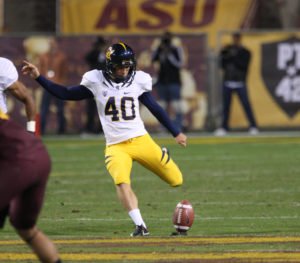
GT: One of the things I admire about college athletes is the way they manage their time. If you are lazy or unorganized, there is no way that you can manage a full-time career, a full-time workload as a student, and as a college athlete, you are doing both. There is a lot of pressure and expectations. So I think time management and organizational skills have been a blessing from my time at Cal. Growing up, I honed in on being very organized, methodical, and structured with my time. Even from a communicative standpoint, when you have so little time to do things, you have to be very effective when you do them, so you learn to communicate well, communicate quickly, succinctly—I hope I’m doing that now! So those few things that you are forced to learn in college, just to survive, I think, can be really helpful in managing a global business. We have operations in Italy and the States, managing the import process, customs, shipping, and then administrative stuff behind the scenes, marketing, logistics, fulfillment. It has a lot of moving parts, just like a full semester at Cal being on the football team.
CAA: Why food and wine? Is this something you’ve always been passionate about?
GT: Yes! Being born in Italy, I grew up with very fond memories of being around a dinner table— for holidays, birthdays, or even just every day Tuesdays. Sitting around the table with my family was always something very nourishing and life-giving, and I think that those small celebrations of life make you enjoy life all the more. When you respect the time that you have to sit down at a table and be present for the meal, respect the people you are enjoying the time with, and respect and cherish the products that you are enjoying, it’s a beautiful time and space.
CAA: ElevenTwelve is homage to your time at Cal—can you expand on significance?
GT: ElevenTwelve references two of the four co-founders’ jersey numbers. I started the company with Vincenzo D’amato, who was a kicker with me, and after me at Cal. It was very serendipitous how we met. We were the only two Italian born football players in the whole country, same position, at the same time, at the same university — we were both kickers at Cal, he was a year after me although we competed for the starting spot on the field we became the best of friends because we had so much in common off the field. When we ran some Cal Football camps as coaching clinics in Northwestern Italy in 2017, 2018, and 2019 we became close friends with these two older gentlemen who were hosting us who played football in Italy—Davide Merlo and Paolo Tempo, jersey number 11 and jersey number 12. Football is what fated us, and it was destiny that we all met together in Italy. We wanted to have an homage, a recall, a reference, to what brought us together. That’s where the ElevenTweleve came from.
CAA: How do you manage playing professionally in Europe and running a business? Do you ever feel pulled in opposite directions during the season?
GT: Absolutely, and thankfully I am very flexible, so I can stretch as much as possible. Learning that there are ways to manage, there are ways of being realistic too, so trying to grow in that aspect of my life too. There are a lot of moving parts, like I said, in any startup, there is a lot of work to do. I have heard it put as, “when you start a company, you feel like you’re drinking from a lot of different hoses.” It seems like you are overwhelmed at all times. I think that it is very appropriate and fitting to my experiences so far. But it’s that feeling of being overwhelmed that drives you to be up for the challenge, embrace the challenge and grow as soon as you are pushed outside your comfort zone. That is when you experience growth that can be very impactful in the future. At the moment, it sucks, but hopefully, if you use it with the first perspective, it can be very fruitful in the future.
CAA: Did you think after graduating from Berkeley that you would become an entrepreneur? Or was this something that fell into your lap?
GT: It fell into my lap by falling onto a table in Italy. Meeting Paolo and Davide around a dinner table, we felt this deep connection and wanted to bring that feeling back to the states with us. It was something that happened very innocently, which has been a theme in my life, maybe—the innocence of that last-minute phone call to Cal, the innocence of that unexpected phone call from the 49ers, and I’m just reacting ’cause it’s a hell of a ride.
CAA: What have been the three most valuable lessons you’ve learned as a business owner?
GT: Three most valuable lessons:
One: Treat people well, maybe I’m being naive, hoping too much for karma, but I have been very fortunate with people treating me well over the years. I feel like I am just paying it forward, trying to go above and beyond by taking care of our customers, our suppliers, or people we come into contact with. The mission is to help people celebrate life, and you do that by treating them well.
Second: Honesty and transparency. Communication is so fundamental in any relationship, business or otherwise. I think, in particular, for a company that’s on two different continents, with two of our founders living in Italy and two living in the States, we have to be very open about what’s going on. It’s already difficult with a nine-hour time difference. Davide and Paolo are older than Vincenzo and me, so it’s a different generation in a different country. Yes, Vincenzo and I were raised Italian, but we were mostly raised in California, so we have a different perspective on a lot of things. The more transparent and communicative we can be, the better equipped we are to manage all these proverbial hoses that spew stuff at us every day.
Third: I am learning a lot about confidence recently. I know a lot of football players feel a little bit insecure, anywhere but the football field because that’s where you’ve grown up, that’s where you know there’s structure there’s clarity. When you’re in another field, so to speak, you don’t have that experience to rely on, so it’s like you’re starting as a true freshman in high school all over again. As I’ve gone forward, I’ve learned to trust your intuition, to trust your judgment. If you’re honest and communicative, and if you treat people well, you can’t go wrong, and if you’ve made a mistake, you move on.
CAA: Can you explain the challenges of operating as an international business? With generational differences, how does Italian and American culture play into how you operate?
GT: The challenges of operating an international business begin with the 9 hour time difference between Italy and the U.S., placing extra emphasis on communication and clarity between co-founders. Then, in the consumer products industry there are many steps and touchpoints from producer to final consumer, as recently highlighted in the supply chain backlog, putting extra emphasis on organization and logistics. It’s almost like a river flowing from a spring to sea with many twists and turns, which represent potential obstacles and issues to be overcome.
CAA: What advice would you give current Cal students graduating into uncertain times?
GT: It’s a hell of a ride. The more you embrace the uncertainty, the easier it is to deal with it. This is something I’m learning to deal with currently too. If you have your priorities clear inside, then the uncertainty is more manageable because you can plan all you want, but you can’t be completely perfect. You can’t anticipate and predict every little thing that happens, but if you make the best decision possible with the information that you have, with the priorities in mind that are in line with your sense of self and values, then you will manage whatever comes your way.
CAA: Favorite meal to cook—and wine to pair with it?
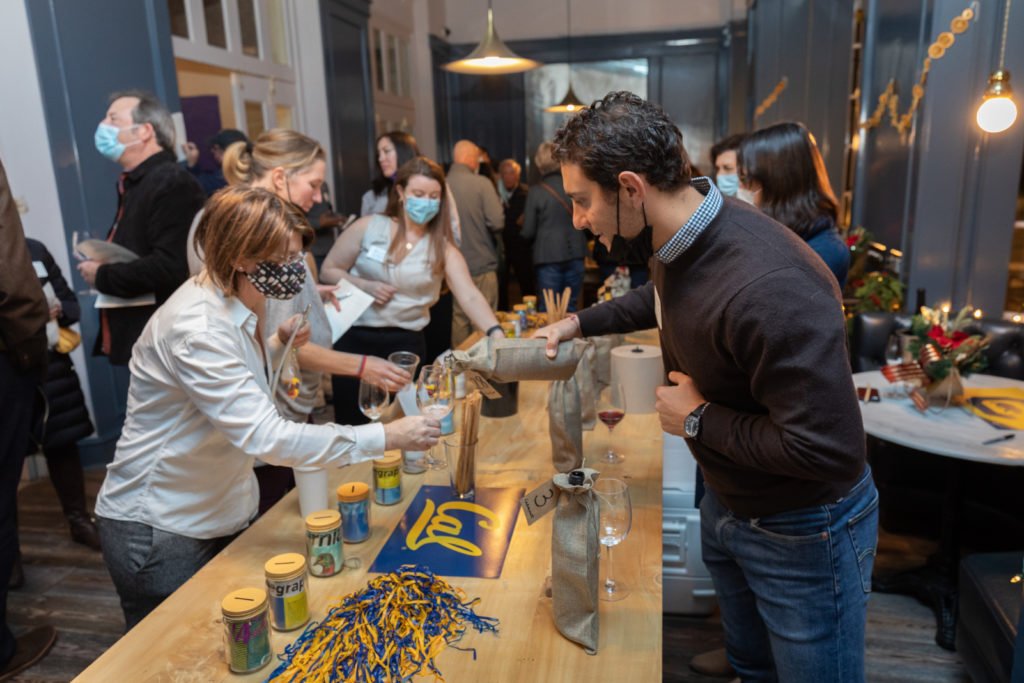
GT: There’s a couple, but I’ll stick with my most intimate answer, which has always been the same. It’s a chicken cutlet, with arugula. A chicken cutlet is a breaded chicken breast, thinly sliced. My mom puts flour, egg, and breadcrumbs, but I just do the egg and breadcrumbs, and then you lightly pan-fry it in good olive oil. To me, it’s the best comfort food. It brings me back to a feeling of safety, fullness, and a fulfillness; well, fulfillment is probably the better word—pun intended. It’s something that, when paired with arugula, which is a little bit bitter and has a different texture, has a bit of a punch to it. You put a little bit of olive oil, a little bit of vinegar, a tiny pinch of salt, and a dash of lemon— you eat them together, and to me, it’s just a match made in heaven. It’s poetry motion; it’s a snap, hold, kick; when all those ingredients are together, and it’s done well, it’s a work of art. Every time I’ve made it, people tend to love it as much as I do, because of the passion I bring to this plate. It’s something so simple you don’t need to be a Michelin-starred chef to make it and make it well. It’s something that I just love to eat, and I would pair it with either our (ElevenTwelve) sauvignon blanc, which is crisp and bright and can keep up with the chicken. The arugula can be a little bit bitter, but you don’t put too much vinegar — don’t put too much vinegar. Or I would pair it with our dogliani wine, which is a very approachable red. It is meant to be enjoyed at all times of the day; it has a balance of dryness but has a quick finish that makes it an easy-drinking wine. That’s what I would pair with it.
CAA: Anything else you’d like to add?
GT: So much! One of the other lessons I’ve learned from Cal is gratitude. From all of these experiences, as you’ve come to know, it seems like there are these opportunities that come my way, and I try to do my best. For me, the first thing I have to do is be grateful for the opportunity because that puts you in a certain headspace and mindset that allows growth. If you are not grateful for the chance, then there is no way you can embrace adversity because you take it as a personal challenge as opposed to an opportunity. Gratitude is something that has been very meaningful to me that I try to continue to emphasize in my life. There are times in my life where I need to emphasize it more, there are times where I am in a good space, but that’s something that if we can live in that space of gratitude then no matter what happens we are going to be okay.
When I was on the football team, I used to think, what is my legacy to be? Leg, right, because I was a kicker: leg-acy. I always thought about how I was going to be remembered. At the time, I felt it was a little bit selfish because it’s about what people think of me. I remember my mom said, “You make a living by what you make, but a life by what you give.” That goes back to that point of gratitude. If you give from a place of gratitude, a place of positive motivation, then you are able to give more of yourself, so that, no matter what happens in the end, you know you gave everything that you had. People remember you more for how you made them feel as opposed to what you did for them, or who you were. In that context of legacy, I want to be able to put my head down at night and know that I gave everything, and I did it with respect, honesty, and transparency, and that I communicated that well. Hopefully, that works out for the business. It seems like every day, there is something new we have to fix, but God willing, we have the opportunity to keep growing and help people celebrate life—that’s the end game.
CAA: Thank you!
GT: You’re welcome! Thanks for the memories.
Transcribed by Noa Berzon
Learn more about Giorgio Tavecchio and shop ElevenTwelve wines and products on their website, eleventwelveusa.com. Use promo code CAL for 20% off.
Enjoy tasting fine wines and supporting the Cal Alumni Association? Join us in celebrating incredible alumni-made wines by signing up for The Graduate Wine Collective, UC Berkeley’s alumni wine club. Members receive three shipments of wine each year and exclusive invitations to wine tasting events.
“I really enjoyed myself at The Graduate Wine Collective Blind Wine Tasting event. It was an evening filled with good people and good wine, which is a recipe for a good laugh and a good life!”
—Giorgio Tavecchio ’12






